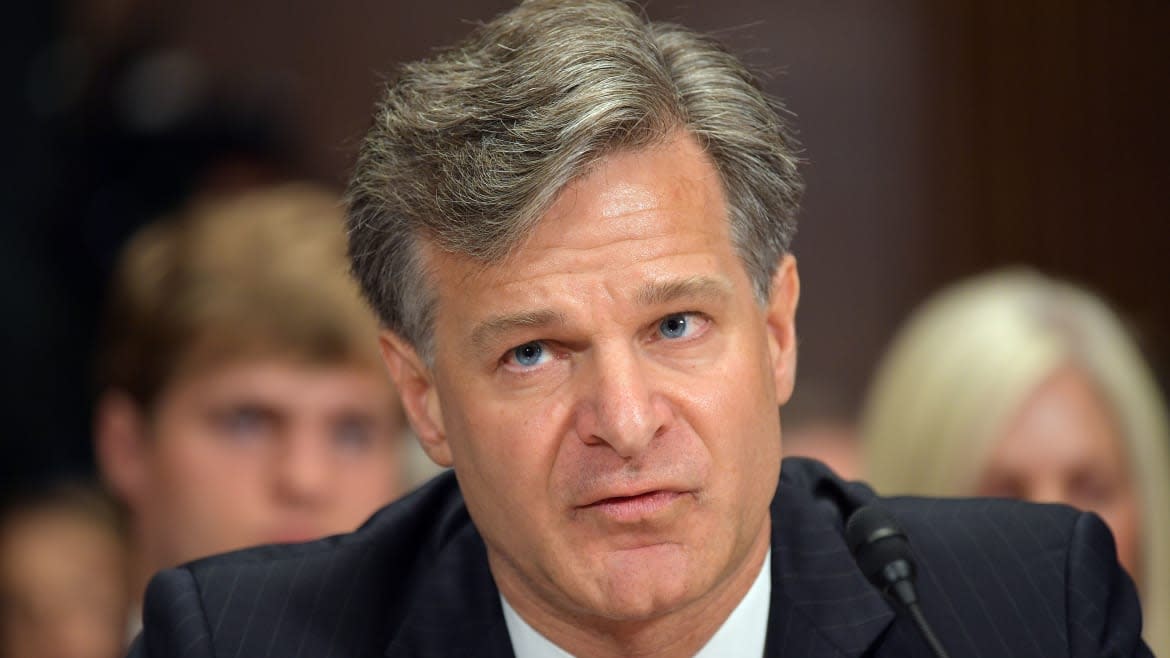FBI Director Shoots Back, Insisting Bureau Shared Intel Ahead of Capitol Insurrection

FBI Director Christopher Wray, pushing back against the Capitol and D.C. police, insisted on Tuesday that his agents shared intelligence with them “in three ways” ahead of the Jan. 6 insurrection.
Making his first substantial public comments on the FBI’s performance since an attack he called “domestic terrorism,” Wray told the Senate Judiciary Committee that the FBI had provided a now-infamous “situational information report” from its Norfolk bureau to D.C.-area law enforcement through an email the night before; an undated verbal briefing at a multi-agency command post set up by the bureau’s Washington Field Office; and through a post on a shared law-enforcement information network.
Norfolk agents “made the judgment to get the information, in three different ways, to their partners, even though they didn’t know if it would be accurate,” Wray testified. The Norfolk memo from Jan. 5 remains undisclosed, but reportedly compiled a social-media thread involving exhortations that “Congress needs to hear glass breaking, doors being kicked in, and blood from their BLM and Pantifa slave soldiers being spilled. Get violent.”
Top Capitol Riot Police Throw Each Other Under the Bus Over Botched Jan. 6 Response
Last week, the former chiefs of Capitol security and the current chief of the Metropolitan Police Department said the briefings were woefully inadequate. Robert Contee, the head of the D.C. police, said he only saw the email and expressed frustration that the FBI did not provide so much as a phone call. Steven Sund, who resigned as Capitol Police chief after the insurrection, testified that he only learned the police received the FBI report slightly before last week’s hearing.
The FBI has also provided unclear and contradictory information about what it knew ahead of Jan. 6. The head of the Washington Field Office, Steven D’Antuono, said two days after the attack that “there was no indication” of a threat to the Capitol before shifting his story the following week and claiming the FBI warned local law enforcement about potentially violent individuals.
Wray did not resolve concerns about the robustness of the FBI warning. Sen. Richard Blumenthal (D-CT), thundered at Wray for not “sound[ing] the alarm in some more visible and ringing way.”
But Wray sought to get the FBI out from under the bus as recriminations over the Capitol insurrection coalesce. Wray suggested that the representatives of local law enforcement were responsible for not sufficiently alerting their superiors about the nebulous FBI warning. “Everyone’s supposed to go back and pass it up their chain,” Wray said.
Simultaneously, Wray neither emphasized the reliability of the Norfolk warning—setting low expectations for when it emerges in public—nor claimed any of the other FBI’s field offices had generated their own warnings. Yet President Donald Trump and elected Republicans for weeks stoked the lie that President Joe Biden and the Democrats stole the election; Trump called for his supporters to gather for a “wild” march on the Capitol; and for days ahead of the rally, pro-Trump online forums exploded with calls for violence.
Wray instead called the Norfolk warning “raw” and lamented the difficulty of determining what social-media-borne threats are more than bluster. He shot back that the FBI had issued generic warnings about domestic extremism before, during, and after the election. And like a senior Justice Department official last week, he suggested he was open to new counterterrorism authorities that civil libertarians have warned against.
After praising the investigations the FBI has conducted under existing powers, which have now resulted in over 270 people arrested, Wray said, “certainly you would be hard-pressed to find any FBI director who wouldn’t welcome more tools in the toolbox.” He said there were now around 2,000 open investigations into domestic terrorism.
But Wray also provided political and euphemistic answers that pointed to the fault lines of the post-Jan. 6 debate over terrorism committed by white Americans with powerful political champions. He dodged a question over whether a rally called by Trump and for the purpose of overturning the election in his favor featured “Trump supporters.” He said instead that the insurrections included “militia violent extremists” and “in some instances ‘racially motivated violent extremists,’ specifically advocates of the superiority of the white race.” The FBI has come under criticism for using a term that obscures the source of the “racially motivated” violence and falsely suggests there is an equivalent threat of violence targeting whites.
Republicans on the committee demonstrated similar false equivalence. The ranking Republican, Sen. Charles Grassley (R-IA), worried aloud about “ever-present left-wing threats,” which the Department of Homeland Security under Trump assessed as marginal compared to white supremacist violence. Sen. Lindsey Graham (R-SC), who reportedly pressured Georgia election officials to throw out valid ballots, wondered if it would have “been easy for international terrorists” to infiltrate the Capitol mob.
Wray provided little information about key questions in the Capitol investigation, including about how Capitol Policeman Brian Sicknick died. But he also said that additional charges, particularly “some of the more advanced charges,” were forthcoming against insurrectionists. “A large and growing number of the people we’ve arrested so far in connection with the 6th are what we’d call militia violent extremism,” Wray told senators and said that there were indications of a “planned and coordinated” assault from some right-wing groups in attendance.
On Wednesday, a different Senate panel will hear the first Jan. 6 testimony from officials at the Departments of Defense and Homeland Security, as well as from Jill Sanborn, Wray’s counterterrorism chief.
Got a tip? Send it to The Daily Beast here
Get our top stories in your inbox every day. Sign up now!
Daily Beast Membership: Beast Inside goes deeper on the stories that matter to you. Learn more.

